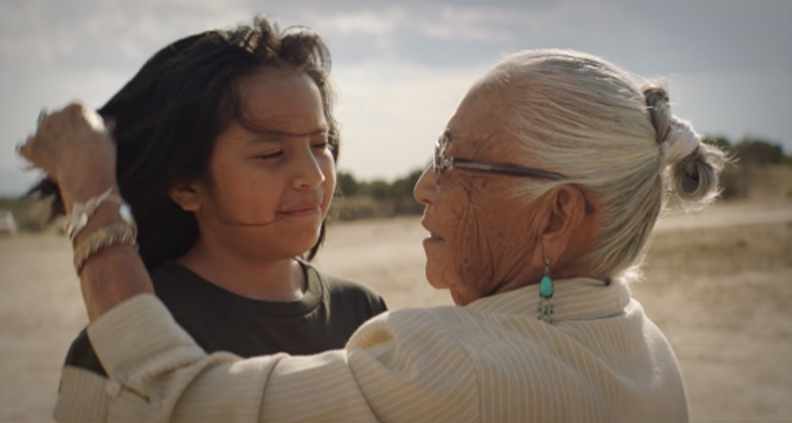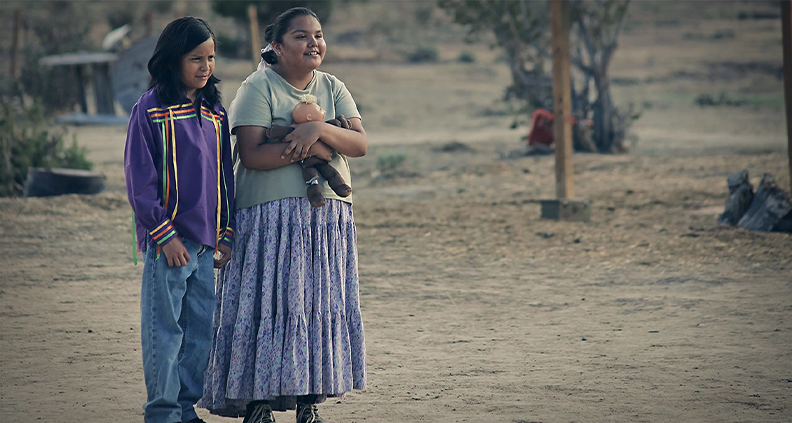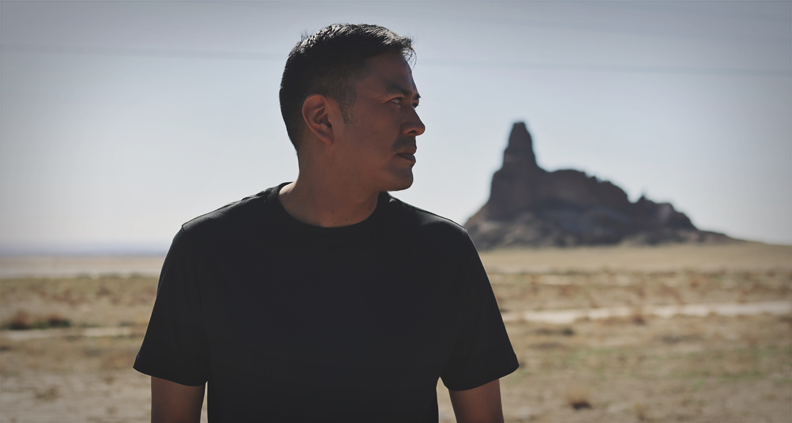Diving Deep: How Billy Luther looked inward to take Frybread Face and Me all the way
You’ve got the idea. You’ve got the drive. You’ve got the script. Now what?
We all know the long, meandering road you have to take to turn an idea into a film. Of course, no two paths are alike. It’s a combination of using your experiences, contacts and a little being in the right place at the right time.
But for writer/director Billy Luther, it was all about getting going deep with his script Frybread Face and Me and making it a project other people couldn’t wait to make. And that all started at the Film Independent Screenwriting Labs– now accepting submissions.
You took Frybread Face And Me into the Film Independent Screenwriting Lab. Can you describe what that experience was like? And how it changed through working in the lab?
I submitted the project in 2019. This was probably my 20th draft, and I submitted it because Film Independent has always been a part of my film life. I came to LA as a Project Involve Fellow and stayed in LA because I just started doing some more projects and working and, my past work had been in documentaries Frybread Face And Me was the first narrative project that I wrote and directed. But, yeah, I went in with the script. I submitted it and had a hope that it would get selected.
I had four other fellows in the lab, and it really was the shaping of the story and characters that really helped let me think about things that I maybe overlooked in the process of writing.
You can sometimes overlook certain parts of storytelling and character and dialog and what I really loved about working on the screenwriting aspect was having the lab advisors and having one on ones with them.
I got to work with Ruth Atkinson, who was incredible with story and making you think outside the box and applying a real-world thinking into storytelling.
And those are the workshops that I loved. Those days that we spent with Ruth diving deep into the places that were sometimes difficult or sensitive or traumatic to writers and artists.
So that was really revealing, not just for the other fellows, lives and stories, but for myself, internally, I really took a deep dive into the story. And I think that’s what helped so much. With what the story is now on screen, I had to dive deep into my past, because the story is loosely based on my life. I don’t know if it was something that I was aware of, when I was not wanting to dive deeper into these things.
But I had this ‘Ah-ha’ moment when I was in the labs of ‘I can go there. I can go deep,’ because I could always pull back. So that was a really wonderful reveal.
The whole process of the labs was understanding the artist deeper, rather than just, ’Hey, let’s just make a funnier film or more dramatic film’. And it was really diving deep into all of our projects, which was so revealing. We had to be vulnerable. And that’s what I really loved about it.
I really enjoyed the film. I love the grandmother character played by Sarah Natani. She was incredible. She spoke in Navajo the whole time, and I loved that sometimes you would give subtitles and sometimes you didn’t, like when you were in the perspective of Benny, where he didn’t quite understand what she was getting at, but her face and her expressions and her intonation, gave you so much. Can you tell me about finding her.
I made my first documentary Miss Navajo in 2007, and that was one of the also the project that was out in fast track at Film Independent. It was a documentary based on the Miss Navajo Nation beauty pageant, and I followed one young woman as she was completing that year.
We stayed with her before the pageant, go into her life and visiting her grandmother. And Sarah was her grandmother. We went a few times, but it didn’t make it into the film.

When I wrote this character, I thought of my grandmother. My grandmother did not speak English, and it was that language barrier that brought us closer for me, coming from the city and coming into the reservation speaking only English and vice versa.
So I really wanted to find that a grandmother like the grandmother I had in my head, my own grandmother. It was difficult because there were actors coming in that were very actor-y and I just I didn’t want her to act. I just wanted to be in her world. The silence is just so much more dramatic and visual.
So, I met with, Sarah. I live in L.A., so I went down to New Mexico to meet with her and discuss the project. And, she had never acted before. She’s been a weaver her entire life. It worked beautifully. It was almost like it was meant to be. I do feel it was meant to be.
What was great about working with her was, she didn’t have lines in the script. I would just tell her every scene like ‘This is what happens, this is what’s going on in the scene. This is what happened before,’ and she would go with it.
Then I would say, ‘Hey, say something in Navajo that you would respond to this, and she would say that. So she started to get the hang of it and she started interacting and listening to the actors.Not in every scene, but every now and then, she would say something wonderful in Navajo, and it was perfect.
It was putting her in these situations that were really fun and reminded me of my grandmother. For example, when the kids were watching Star Man for Benny’s first time and she’s sitting there on the couch saying, ‘This movie makes no sense,’ that was an experience that I had with my grandmother when we watched movies! Those are moments that I think that were really incredible with Sarah.
She’s going to be in the upcoming Netflix Rez Ball movie. So she got an acting gig right after Frybread. So, yeah, she’s amazing. And I did a short documentary on her, on how weaving and her life this past summer. So I’m editing right now.
I will look out for that when that comes out. That’s exciting. You started out in doc. Tell me about why you transitioned into narrative and what you think you brought over from one to the other?
I went to film school to write and direct narrative films, but I came to L.A. in early 2000 and it was difficult to be a first-time director to go in and say, ‘Hey, this is the film.’
So, I just had this idea that was Miss Navajo, the documentary. My mother was Miss Navajo in the 60s, so the story has been around my life growing up.
So I borrowed a camera, and I was like, ‘I’m going to make this a documentary, because I can just borrow a camera and go and shoot’. So that’s what I did. It was an easier, cheaper way for me to make a film.
Then after that, I started working in documentaries, one after the other. I love them, but I always wanted to go back to writing. I burn out at a point because documentaries, they take years, and you have to really follow a subject. To survive on a documentarian budget,I mean, it’s difficult.
I just had this idea for the Frybread story. When I was shooting this web series for PBS, I would take time and write. And then I go back and start filming again and go back and write. It was great because I just was able get everything that I wanted to get out on paper with the first draft of the story. It gave me that foundation.
I did it, even though it wasn’t the greatest thing to share. But it just felt good.
I started writing, and I just didn’t stop. I knew I wanted to tell this story. So that was my journey back into writing.
But documentary came into play when I was on set with Frybread because the majority of my actors were non-actors or first-time actors. Especially Grandmother, being in her world, like I said before, we’re telling the camera, ‘Let’s shoot her like we’re in her world. Let’s don’t worry about her hitting her marks. Let’s just be with her.’
And then whenever she was on set with other actors, everybody just felt that she was their grandmother. Also, when I was working with the kids, I was like, ‘You guys are free to be as fluid as you want to on set.
My camera department and I really had this discussion of just being in these worlds. Especially since we’re in this vast landscape outdoors, we really wanted to give these kids and a lot of the actors, this freedom. Except for when we were in these limited spaces, like the kitchen and the trailer. Working with these first-time actors, I just felt like you’re working in a documentary.

After you left the labs, how did you go from it being this finished written piece, to going into production and like lining up funding.
The Screenwriting Labs happened, and then we submitted to the Film Independent Directing Labs with the script that we had. It was selected for the Directing Labs, but it was the pandemic, so we had to work on everything on zoom.
We weren’t able to go in and shoot or be hands-on working with actors. Lisa Robertson, who has worked with the labs for years, directing actors, was so pivotal in our creativity and development of our stories and our scripts.
I wanted to get the script and this package together pretty quickly. So as the Directing Labs were happening, I was putting my deck together, and all of the things you need to start going off pitching.
Taika Waititi is a good friend of mine. We talked about this project that I had, and I gave him a script, and he jumped on as EP. And that helped immensely, especially being a first-time writer/director. His support for indigenous storytelling and storytellers is huge.
We started to get meetings here and there, and we worked closely with Film Independent. Angela Lee was great for introducing me to investors. So, it was it’s a combination of people that I’ve known for the 20 years I’ve been in L.A.
Angela and her team, it was so pivotal in us moving forward and getting this getting made.
And then it took it took over a year for us to edit. It was really hard to work editing during Covid. There were just a lot of challenges that were thrown our way, as every film has.
I don’t know how it got made. I look back and say, ‘I don’t know how I did it’, but it screens and people talk to me about it. I’m just like, ‘I don’t know how I did that…”
It all worked in a very exciting way. Especially being my first narrative.
And then we also had our distributor, Ava DuVernay their company. Array, which gave us, launching pad on Netflix. I pinch myself. It happened from Film Independent on, to Netflix and to reaching out to people around the world.
So, I think it’s been incredible.

What piece of advice would you give to a filmmaker who would want to apply to our Screenwriting Labs?
Many first-time screenwriters or people who are looking to get their first feature made, they want to hurry up. They already want to be at the finish line. And that was like me.
You want to get your stuff made. ‘Oh, I know this person. This person could be my funder’, but you’re not really thinking about a script that’s in your face. You have to be open and ready to go through each page and spend time. When I sent my script to Film Independent the first time for the Screenwriting Labs, I was like, ‘This is ready to get made.‘ No. It took a year. You have to take the time and spend time with it.
One of the takeaways is: people making the decisions to move your script forward and be part of these programs aren’t looking for you to get a story made in the next five months.
They want to make sure that you are ready to do the work to get the story ready.
And then also just, the people and the creative advisors. I’m still in contact with the majority of the people who were in my labs. I just had this connection with them. It was really rewarding when we went to screen at the Film Independent Film Forum opening night this year, all the advisors who are my advisors are in the labs were there, and that was really freaking cool.
And again, I tell everybody, it’s a lot of hard work, but it’s worth it.
Thank you so much for taking the time to talk to me. I really enjoyed it.
To learn more about the 2025 Film Independent Screenwriting Lab, including how to apply click here. The deadline for general submissions is for non-members is Monda, August 26th The Member deadline is Monday, September 9th.
Screenwriting Lab Fellowships:
The Climate Entertainment Development Grant: The Climate Entertainment Initiative awards a $25,000 development grant to a filmmaker who is accepted into Film Independent’s Screenwriting Lab or Fast Track with a climate-focused fiction feature.
MPAC Hollywood Bureau Fellowship: The MPAC Hollywood Bureau Fellowship provides a $10,000 grant to a filmmaker who identifies as American-Muslim and is accepted into Film Independent’s Artist Development programs, including the Screenwriting Lab.
Learn more about our Fellowships.
Are you a Member? Film Independent Members get an exclusive extended application deadline for the Screenwriting Lab and save 30% on application fees, and Filmmaker Pro Members can apply for free! Join for extra time and savings.
Keep up with Film Independent…